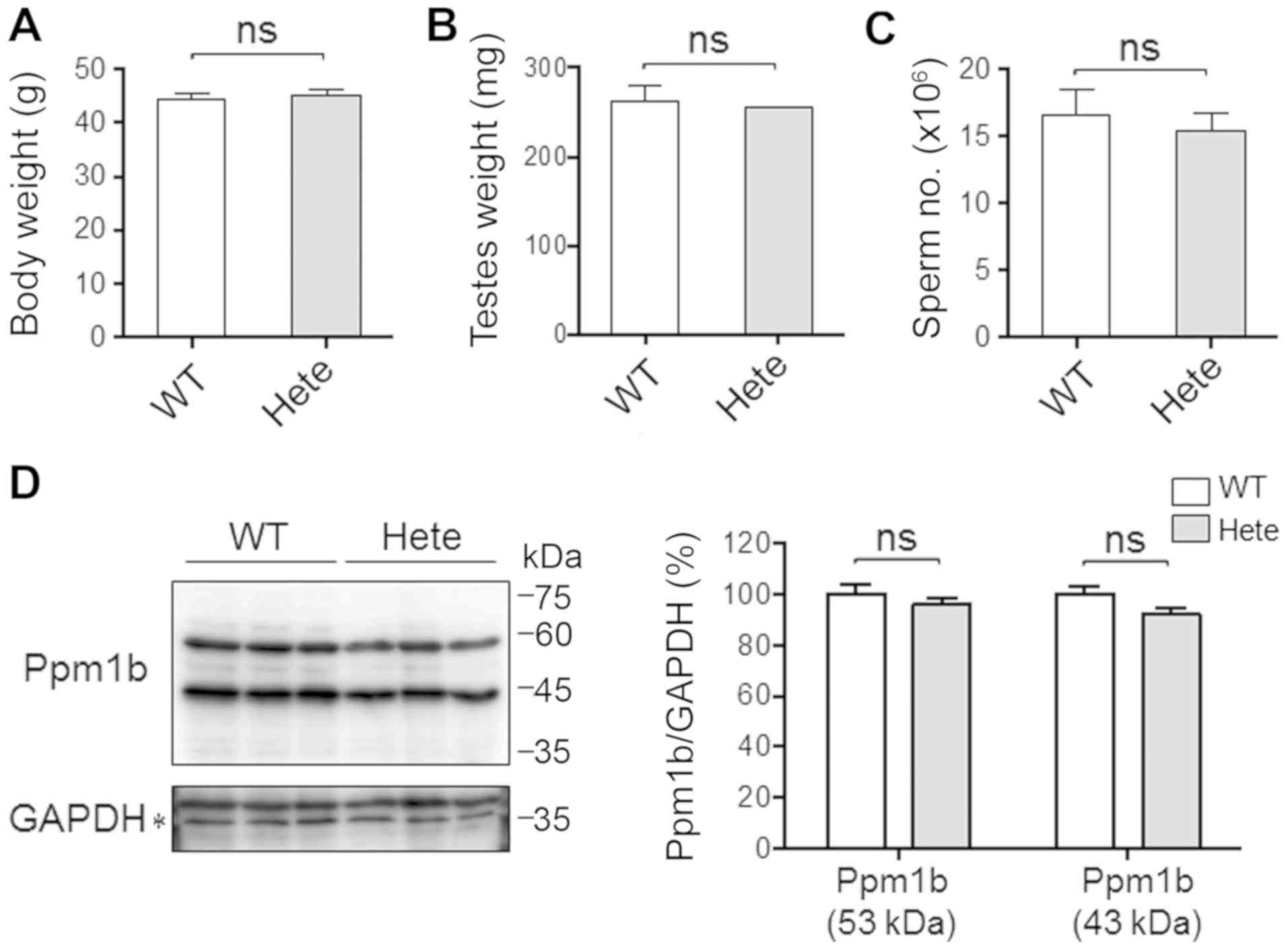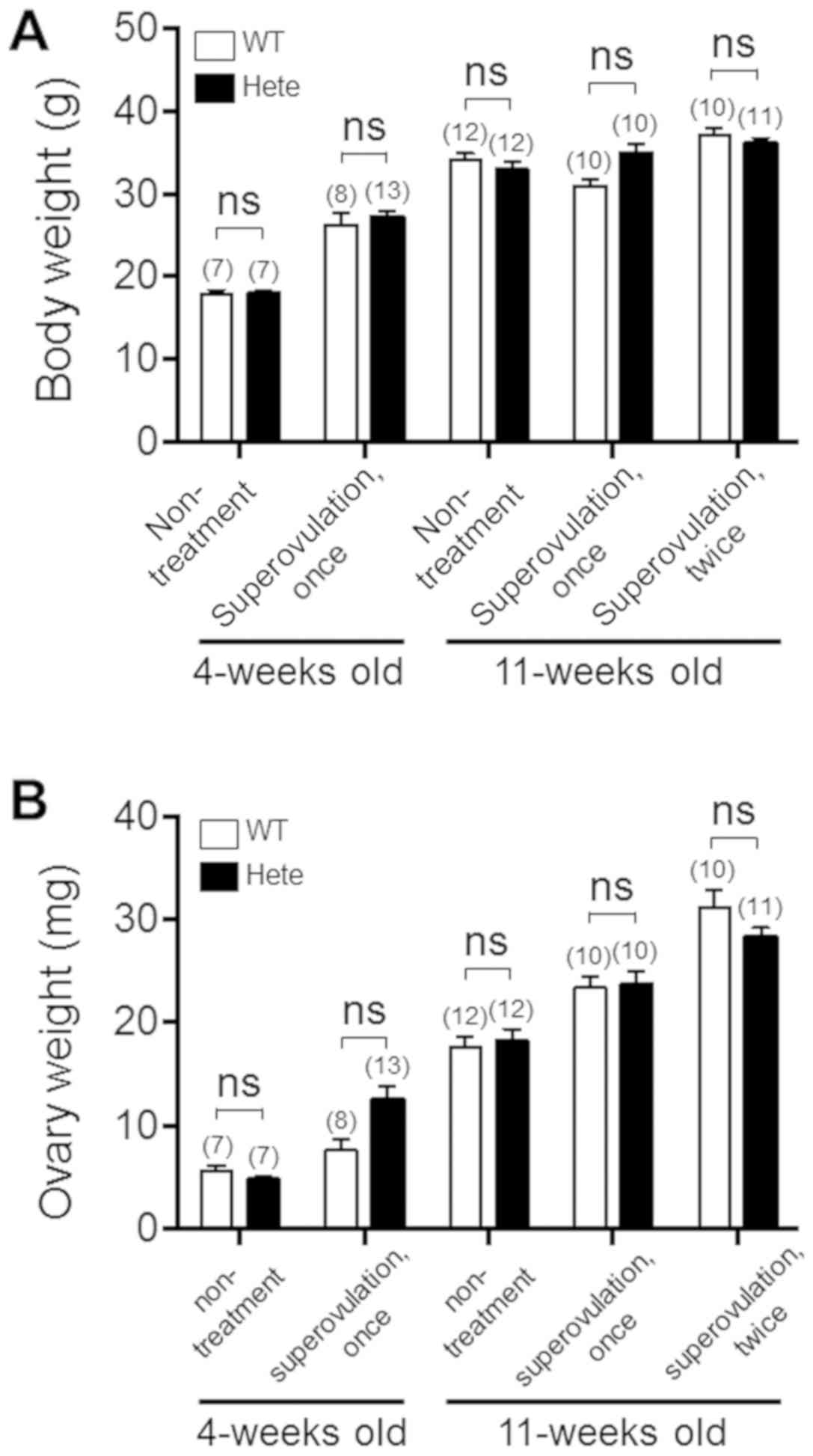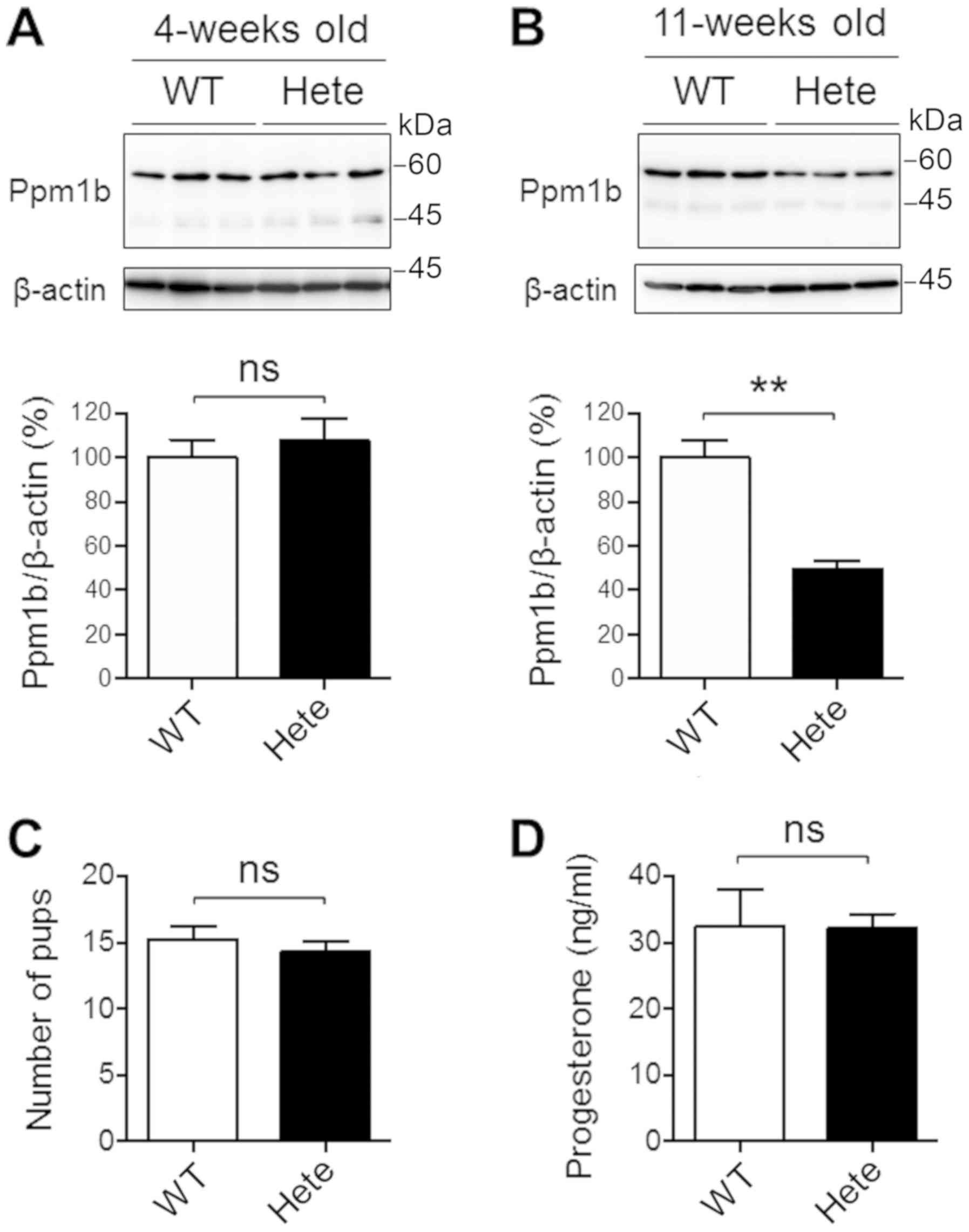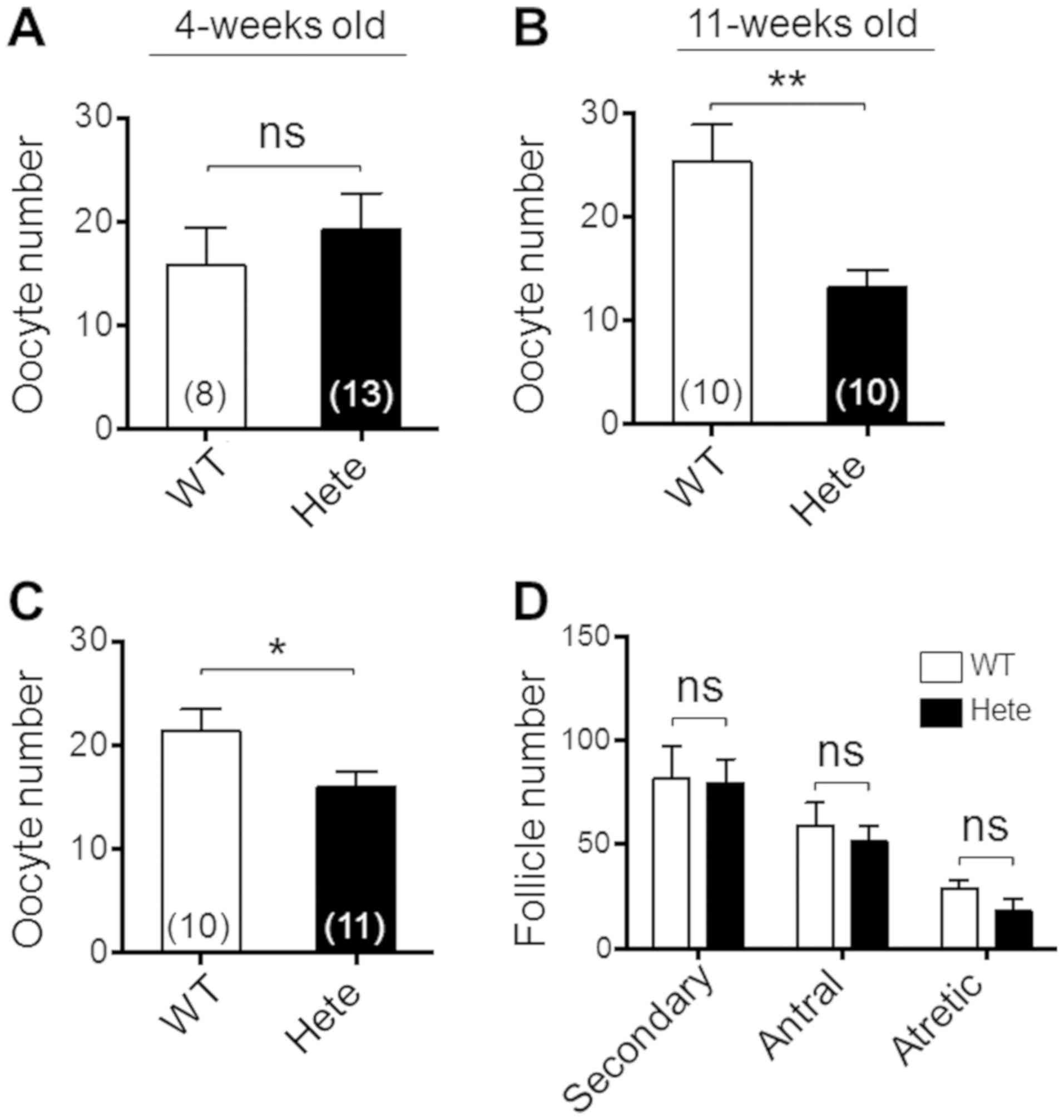|
1
|
Shi Y: Serine/threonine phosphatases:
Mechanism through Structure. Cell. 139:468–484. 2009. View Article : Google Scholar : PubMed/NCBI
|
|
2
|
Lifschitz-Mercer B, Sheinin Y, Ben-Meir D,
Bramante- Schreiber L, Leider-Trejo L, Karby S, Smorodinsky NI and
Lavi S: Protein phosphatase 2Calpha expression in normal human
tissues: An immunohistochemical study. Histochem Cell Biol.
116:31–39. 2001.PubMed/NCBI
|
|
3
|
Lin X, Duan X, Liang YY, Su Y, Wrighton
KH, Long J, Hu M, Davis CM, Wang J, Brunicardi FC, et al: PPM1A
functions as a Smad phosphatase to terminate TGF-beta signaling.
Cell. 125:915–928. 2006. View Article : Google Scholar : PubMed/NCBI
|
|
4
|
Sasaki M, Ohnishi M, Tashiro F, Niwa H,
Suzuki A, Miyazaki J, Kobayashi T and Tamura S: Disruption of the
mouse protein Ser/Thr phosphatase 2Cbeta gene leads to early
pre-implantation lethality. Mech Dev. 124:489–499. 2007. View Article : Google Scholar : PubMed/NCBI
|
|
5
|
Takekawa M, Maeda T and Saito H: Protein
phosphatase 2Calpha inhibits the human stress-responsive p38 and
JNK MAPK pathways. EMBO J. 17:4744–4752. 1998. View Article : Google Scholar : PubMed/NCBI
|
|
6
|
Duan X, Liang YY, Feng XH and Lin X:
Protein serine/threonine phosphatase PPM1A dephosphorylates Smad1
in the bone morphogenetic protein signaling pathway. J Biol Chem.
281:36526–36532. 2006. View Article : Google Scholar : PubMed/NCBI
|
|
7
|
Dai F, Shen T, Li Z, Lin X and Feng XH:
PPM1A dephosphorylates RanBP3 to enable efficient nuclear export of
Smad2 and Smad3. EMBO Rep. 12:1175–1181. 2011. View Article : Google Scholar : PubMed/NCBI
|
|
8
|
Hanada M, Kobayashi T, Ohnishi M, Ikeda S,
Wang H, Katsura K, Yanagawa Y, Hiraga A, Kanamaru R and Tamura S:
Selective suppression of stress-activated protein kinase pathway by
protein phosphatase 2C in mammalian cells. FEBS Lett. 437:172–176.
1998. View Article : Google Scholar : PubMed/NCBI
|
|
9
|
Hanada M, Ninomiya-Tsuji J, Komaki K,
Ohnishi M, Katsura K, Kanamaru R, Matsumoto K and Tamura S:
Regulation of the TAK1 signaling pathway by protein phosphatase 2C.
J Biol Chem. 276:5753–5759. 2001. View Article : Google Scholar : PubMed/NCBI
|
|
10
|
Prajapati S, Verma U, Yamamoto Y, Kwak YT
and Gaynor RB: Protein phosphatase 2Cbeta association with the
IkappaB kinase complex is involved in regulating NF-kappaB
activity. J Biol Chem. 279:1739–1746. 2004. View Article : Google Scholar : PubMed/NCBI
|
|
11
|
Sun W, Yu Y, Dotti G, Shen T, Tan X,
Savoldo B, Pass AK, Chu M, Zhang D, Lu X, et al: PPM1A and PPM1B
act as IKKbeta phosphatases to terminate TNFalpha-induced
IKKbeta-NF-kappaB activation. Cell Signal. 21:95–102. 2009.
View Article : Google Scholar : PubMed/NCBI
|
|
12
|
Zuo S, Xue Y, Tang S, Yao J, Du R, Yang P
and Chen X: 14-3-3 epsilon dynamically interacts with key
components of mitogen-activated protein kinase signal module for
selective modulation of the TNF-alpha-induced time course-dependent
NF-kappaB activity. J Proteome Res. 9:3465–3478. 2010. View Article : Google Scholar : PubMed/NCBI
|
|
13
|
Hardie DG: AMP-activated protein kinase:
An energy sensor that regulates all aspects of cell function. Genes
Dev. 25:1895–1908. 2011. View Article : Google Scholar : PubMed/NCBI
|
|
14
|
Carling D, Mayer FV, Sanders MJ and
Gamblin SJ: AMP-activated protein kinase: Nature's energy sensor.
Nat Chem Biol. 7:512–518. 2011. View Article : Google Scholar : PubMed/NCBI
|
|
15
|
Chida T, Ando M, Matsuki T, Masu Y,
Nagaura Y, Takano- Yamamoto T, Tamura S and Kobayashi T:
N-Myristoylation is essential for protein phosphatases PPM1A and
PPM1B to dephosphorylate their physiological substrates in cells.
Biochem J. 449:741–749. 2013. View Article : Google Scholar : PubMed/NCBI
|
|
16
|
Tasdelen I, van Beekum O, Gorbenko O,
Fleskens V, van den Broek NJF, Koppen A, Hamers N, Berger R, Coffer
PJ, Brenkman AB and Kalkhoven E: The serine/threonine phosphatase
PPM1B (PP2Cβ) selectively modulates PPARγ activity. Biochem J.
451:45–53. 2013. View Article : Google Scholar : PubMed/NCBI
|
|
17
|
Tontonoz P and Spiegelman BM: Fat and
beyond: The diverse biology of PPARgamma. Annu Rev Biochem.
77:289–312. 2008. View Article : Google Scholar : PubMed/NCBI
|
|
18
|
Park JH, Smith RJ, Shieh SY and Roeder RG:
The GAS41-PP2Cbeta complex dephosphorylates p53 at serine 366 and
regulates its stability. J Biol Chem. 286:10911–10917. 2011.
View Article : Google Scholar : PubMed/NCBI
|
|
19
|
Park JH, Hale TK, Smith RJ and Yang T:
PPM1B depletion induces premature senescence in human IMR-90
fibroblasts. Mech Ageing Dev. 138:45–52. 2014. View Article : Google Scholar : PubMed/NCBI
|
|
20
|
Wenk J, Trompeter HI, Pettrich KG, Cohen
PT, Campbell DG and Mieskes G: Molecular cloning and primary
structure of a protein phosphatase 2C isoform. FEBS Lett.
297:135–138. 1992. View Article : Google Scholar : PubMed/NCBI
|
|
21
|
Terasawa T, Kobayashi T, Murakami T,
Ohnishi M, Kato S, Tanaka O, Kondo H, Yamamoto H, Takeuchi T and
Tamura S: Molecular cloning of a novel isotype of Mg(2+)-dependent
protein phosphatase beta (type 2C beta) enriched in brain and
heart. Arch Biochem Biophys. 307:342–349. 1993. View Article : Google Scholar : PubMed/NCBI
|
|
22
|
Hou EW, Kawai Y, Miyasaka H and Li SS:
Molecular cloning and expression of cDNAs encoding two isoforms of
protein phosphatase 2C beta from mouse testis. Biochem Mol Biol
Int. 32:773–780. 1994.PubMed/NCBI
|
|
23
|
Kato S, Terasawa T, Kobayashi T, Ohnishi
M, Sasahara Y, Kusuda K, Yanagawa Y, Hiraga A, Matsui Y and Tamura
S: Molecular cloning and expression of mouse mg(2+)-dependent
protein phosphatase beta-4 (type 2C beta-4). Arch Biochem Biophys.
318:387–393. 1995. View Article : Google Scholar : PubMed/NCBI
|
|
24
|
Kato S, Kobayashi T, Kusuda K, Nishina Y,
Nishimune Y, Yomogida K, Yamamoto M, Sakagami H, Kondo H, Ohnishi
M, et al: Differentiation-dependent enhanced expression of protein
phosphatase 2Cbeta in germ cells of mouse seminiferous tubules.
FEBS Lett. 396:293–297. 1996. View Article : Google Scholar : PubMed/NCBI
|
|
25
|
Chen W, Wu J, Li L, Zhang Z, Ren J, Liang
Y, Chen F, Yang C, Zhou Z, Su SS, et al: Ppm1b negatively regulates
necroptosis through dephosphorylating Rip3. Nat Cell Biol.
17:434–444. 2015. View Article : Google Scholar : PubMed/NCBI
|
|
26
|
Iuchi Y, Okada F, Tsunoda S, Kibe N,
Shirasawa N, Ikawa M, Okabe M, Ikeda Y and Fujii J: Peroxiredoxin 4
knockout results in elevated spermatogenic cell death via oxidative
stress. Biochem J. 419:149–158. 2009. View Article : Google Scholar : PubMed/NCBI
|
|
27
|
Myers M, Britt KL, Wreford NGM, Ebling FJP
and Kerr JB: Methods for quantifying follicular numbers within the
mouse ovary. Reproduction. 127:569–580. 2004. View Article : Google Scholar : PubMed/NCBI
|
|
28
|
Kimura N, Tsunoda S, Iuchi Y, Abe H,
Totsukawa K and Fujii J: Intrinsic oxidative stress causes either
2-cell arrest or cell death depending on developmental stage of the
embryos from SOD1-deficient mice. Mol Hum Reprod. 16:441–451. 2010.
View Article : Google Scholar : PubMed/NCBI
|
|
29
|
Jabbour HN, Sales KJ, Catalano RD and
Norman JE: Inflammatory pathways in female reproductive health and
disease. Reproduction. 138:903–919. 2009. View Article : Google Scholar : PubMed/NCBI
|
|
30
|
Adhikari D and Liu K: Molecular mechanisms
underlying the activation of mammalian primordial follicles. Endocr
Rev. 30:438–464. 2009. View Article : Google Scholar : PubMed/NCBI
|
|
31
|
Adhikari D, Flohr G, Gorre N, Shen Y, Yang
H, Lundin E, Lan Z, Gambello MJ and Liu K: Disruption of Tsc2 in
oocytes leads to overactivation of the entire pool of primordial
follicles. Mol Hum Reprod. 15:765–770. 2009. View Article : Google Scholar : PubMed/NCBI
|
|
32
|
Adhikari D, Zheng W, Shen Y, Gorre N,
Hämäläinen T, Cooney AJ, Huhtaniemi I, Lan ZJ and Liu K: Tsc/mTORC1
signaling in oocytes governs the quiescence and activation of
primordial follicles. Hum Mol Genet. 19:397–410. 2010. View Article : Google Scholar : PubMed/NCBI
|
|
33
|
Tong Y, Li F, Lu Y, Cao Y, Gao J and Liu
J: Rapamycin-sensitive mTORC1 signaling is involved in
physiological primordial follicle activation in mouse ovary. Mol
Reprod Dev. 80:1018–1034. 2013. View Article : Google Scholar : PubMed/NCBI
|
|
34
|
Light A and Hammes SR: Membrane receptor
cross talk in steroidogenesis: Recent insights and clinical
implications. Steroids. 78:633–638. 2013. View Article : Google Scholar : PubMed/NCBI
|
|
35
|
Mizutani T, Ishikane S, Kawabe S, Umezawa
A and Miyamoto K: Transcriptional regulation of genes related to
progesterone production. Endocr J. 62:757–763. 2015. View Article : Google Scholar : PubMed/NCBI
|
|
36
|
Yasui H, Hayashi S and Sakurai H: Possible
involvement of singlet oxygen species as multiple oxidants in p450
catalytic reactions. Drug Metab Pharmacokinet. 20:1–13. 2005.
View Article : Google Scholar : PubMed/NCBI
|
|
37
|
Rhee SG, Woo HA, Kil IS and Bae SH:
Peroxiredoxin functions as a peroxidase and a regulator and sensor
of local peroxides. J Biol Chem. 287:4403–4410. 2012. View Article : Google Scholar : PubMed/NCBI
|
|
38
|
Finkel T: Signal transduction by reactive
oxygen species. J Cell Biol. 194:7–15. 2011. View Article : Google Scholar : PubMed/NCBI
|
|
39
|
Bae YS, Oh H, Rhee SG and Yoo YD:
Regulation of reactive oxygen species generation in cell signaling.
Mol Cells. 32:491–509. 2011. View Article : Google Scholar : PubMed/NCBI
|
|
40
|
Siddappa D, Kalaiselvanraja A, Bordignon
V, Dupuis L, Gasperin BG, Roux PP and Duggavathi R: Mechanistic
target of rapamycin (MTOR) signaling during ovulation in mice. Mol
Reprod Dev. 81:655–665. 2014. View Article : Google Scholar : PubMed/NCBI
|
|
41
|
Abraham S, Paknikar R, Bhumbra S, Luan D,
Garg R, Dressler GR and Patel SR: The Groucho-associated
phosphatase PPM1B displaces Pax transactivation domain interacting
protein (PTIP) to switch the transcription factor Pax2 from a
transcriptional activator to a repressor. J Biol Chem.
290:7185–7194. 2015. View Article : Google Scholar : PubMed/NCBI
|
|
42
|
Miller RE, Uwamahoro N and Park JH: PPM1B
depletion in U2OS cells supresses cell growth through RB1-E2F1
pathway and stimulates bleomycin-induced cell death. Biochem
Biophys Res Commun. 500:391–397. 2018. View Article : Google Scholar : PubMed/NCBI
|
|
43
|
Cho HJ, Kim JT, Lee SJ, Hwang YS, Park SY,
Kim BY, Yoo J, Hong KS, Min JK, Lee CH, et al: Protein phosphatase
1B dephosphorylates Rho guanine nucleotide dissociation inhibitor 1
and suppresses cancer cell migration and invasion. Cancer Lett.
417:141–151. 2018. View Article : Google Scholar : PubMed/NCBI
|


















